Dumbest Internet Scams People Unfortunately Fall For
Nathan Johnson
Published
08/11/2016
in
wow
Internet scams have become a common and pervasive facet of modern-day web life.
- List View
- Player View
- Grid View
Advertisement
-
1.
 No list about Internet scams would be complete without the iconic Nigerian email scam. The story goes that a rich Nigerian prince (or the lawyer for a foreigner who recently died with no heirs) wants to get money out of the country. In exchange for using your bank account as safe keeping, he’ll give you a pretty hefty cut of the cash. The catch is he always starts by asking for money from you – to pay for bribes, taxes, bank fees, and anything else he can think of.
No list about Internet scams would be complete without the iconic Nigerian email scam. The story goes that a rich Nigerian prince (or the lawyer for a foreigner who recently died with no heirs) wants to get money out of the country. In exchange for using your bank account as safe keeping, he’ll give you a pretty hefty cut of the cash. The catch is he always starts by asking for money from you – to pay for bribes, taxes, bank fees, and anything else he can think of. -
2.
 Humans naturally feel a desire to help others in need which is why we see such a massive outpouring of global support and funds to areas hit by disaster. Internet scam artists try to cash in on people’s generosity by creating fake websites or sending fake emails asking you for money to help the victims of the tragedy. The only victim in this scenario becomes your bank account, a bit lighter after you send off a few hundred bucks.
Humans naturally feel a desire to help others in need which is why we see such a massive outpouring of global support and funds to areas hit by disaster. Internet scam artists try to cash in on people’s generosity by creating fake websites or sending fake emails asking you for money to help the victims of the tragedy. The only victim in this scenario becomes your bank account, a bit lighter after you send off a few hundred bucks. -
3.
 Have you ever received an email from a friend’s true email address, claiming they were mugged at gunpoint on their trip to Macedonia? (Did you even know they were going to Macedonia?) This Internet scam goes that your friend had all his/her money, valuables, and credit cards stolen, and needs your help to pay off the hotel bills or to buy a flight home. Hopefully you don’t send any money because all of these schemes are just malware that hackers have installed onto your friend’s computer.
Have you ever received an email from a friend’s true email address, claiming they were mugged at gunpoint on their trip to Macedonia? (Did you even know they were going to Macedonia?) This Internet scam goes that your friend had all his/her money, valuables, and credit cards stolen, and needs your help to pay off the hotel bills or to buy a flight home. Hopefully you don’t send any money because all of these schemes are just malware that hackers have installed onto your friend’s computer. -
4.
 The holidays are high time for people to send off warm greetings, and scammers know this. Internet thieves jump in on the holiday cheer, sending millions of fake holiday greeting e-cards each year. To open the card, a message often appears that you have to update your flash player. You click update, but what really gets updated is your computer – with a fresh set of malware and spyware, compromising your security.
The holidays are high time for people to send off warm greetings, and scammers know this. Internet thieves jump in on the holiday cheer, sending millions of fake holiday greeting e-cards each year. To open the card, a message often appears that you have to update your flash player. You click update, but what really gets updated is your computer – with a fresh set of malware and spyware, compromising your security. -
5.
 Craigslist can be a great place to sell your stuff – until you fall for a scam. Let’s say you’re trying to sell your old drone and someone wants to pay you triple the asking price to ship it to her in Italy. Sounds great. She mails you a check to cover the price of the drone and shipping; you deposit it into your bank and send over the drone and part of the fee to cover the cost of shipping. Seems like you made a nice profit, until your bank calls to tell you the check was a forgery and now you’re out $500 and your drone.
Craigslist can be a great place to sell your stuff – until you fall for a scam. Let’s say you’re trying to sell your old drone and someone wants to pay you triple the asking price to ship it to her in Italy. Sounds great. She mails you a check to cover the price of the drone and shipping; you deposit it into your bank and send over the drone and part of the fee to cover the cost of shipping. Seems like you made a nice profit, until your bank calls to tell you the check was a forgery and now you’re out $500 and your drone. -
6.
 If you’re tired of getting junk mail saying you’ve been pre-approved for a new credit card, you’ll probably also overlook the fantastic offers which come to your email with a pre-approved Visa or MasterCard. This Internet hoax works by getting you to pay the annual fee upfront and then never contacting you again.
If you’re tired of getting junk mail saying you’ve been pre-approved for a new credit card, you’ll probably also overlook the fantastic offers which come to your email with a pre-approved Visa or MasterCard. This Internet hoax works by getting you to pay the annual fee upfront and then never contacting you again. -
7.
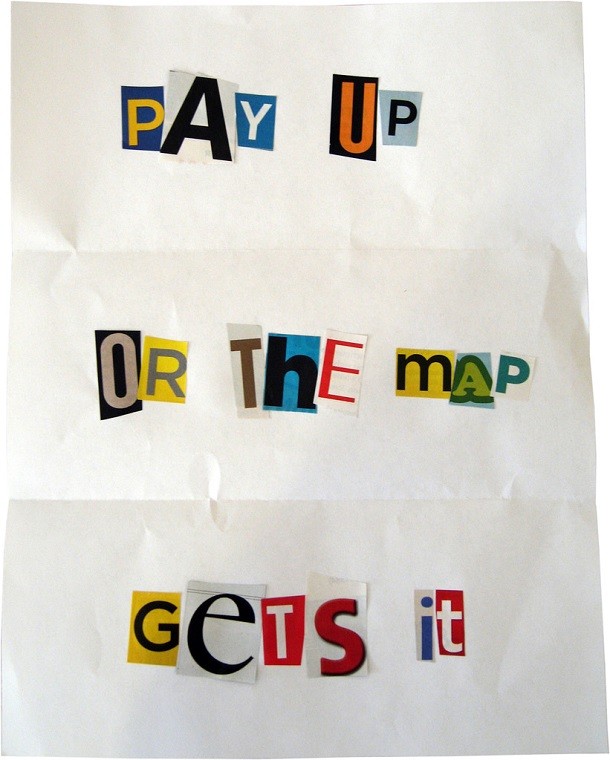 Though we’re shocked people in today’s world fall for this, some Internet tricksters send you an email no better than cut-out letters glued to a page where they threaten to kill you or a family member if you don’t pay ransom money. Sometimes they even include personal details pulled from social media searches. A quick call to your relative will show you they’re safe and sound and the scammer – going by an email address like cutkiller244@email.com – is a liar.
Though we’re shocked people in today’s world fall for this, some Internet tricksters send you an email no better than cut-out letters glued to a page where they threaten to kill you or a family member if you don’t pay ransom money. Sometimes they even include personal details pulled from social media searches. A quick call to your relative will show you they’re safe and sound and the scammer – going by an email address like cutkiller244@email.com – is a liar. -
8.
 In today’s relatively volatile economy, fraudsters are appealing to people’s need for stability by recommending that they purchase the “secure retirement investment” of gold and silver. Upon calling the toll-free number, the scammers ask for a deposit by credit card, followed by a wire transfer for the remainder. Loads of buyers have never receive the promised precious metals. Unfortunately, it’s often the elderly who use a chunk of their retirement checks to pay for it.
In today’s relatively volatile economy, fraudsters are appealing to people’s need for stability by recommending that they purchase the “secure retirement investment” of gold and silver. Upon calling the toll-free number, the scammers ask for a deposit by credit card, followed by a wire transfer for the remainder. Loads of buyers have never receive the promised precious metals. Unfortunately, it’s often the elderly who use a chunk of their retirement checks to pay for it. -
9.
 It seems every company in the world wants us to take their survey. Scammers have picked up on this and begun sending out false surveys which, when you click on them, will install malicious spyware on your computer, giving the no-gooder the ability to see any passwords you enter, bank account balances you view, and basically anything you do online.
It seems every company in the world wants us to take their survey. Scammers have picked up on this and begun sending out false surveys which, when you click on them, will install malicious spyware on your computer, giving the no-gooder the ability to see any passwords you enter, bank account balances you view, and basically anything you do online. -
10.
 They say love makes you crazy; for some people it also makes them stupid. There have been countless reports of (mostly) men on dating sites finding the perfect girl: cute, charming, evocative, and so excited to meet him. Trouble is…she needs some money for the plane ticket to come see you. Oh, and her rent is due next week, and she’s a bit short. Oh, and she’s probably a 45 year old man writing you in his underwear from his dimly lit basement.
They say love makes you crazy; for some people it also makes them stupid. There have been countless reports of (mostly) men on dating sites finding the perfect girl: cute, charming, evocative, and so excited to meet him. Trouble is…she needs some money for the plane ticket to come see you. Oh, and her rent is due next week, and she’s a bit short. Oh, and she’s probably a 45 year old man writing you in his underwear from his dimly lit basement. -
11.
 Festivals are all the rage in the summertime, and Internet scams have been popping up all around them. The story goes that a scammer creates an advertisement for a local festival – maybe a lobster fest or a weekend of Middle Eastern music – and sells tickets. Excited for the feast or the show, you buy the ticket and arrive at the festival venue only to find a host of other people standing around wondering if they got the wrong date, too, or if they were scammed.
Festivals are all the rage in the summertime, and Internet scams have been popping up all around them. The story goes that a scammer creates an advertisement for a local festival – maybe a lobster fest or a weekend of Middle Eastern music – and sells tickets. Excited for the feast or the show, you buy the ticket and arrive at the festival venue only to find a host of other people standing around wondering if they got the wrong date, too, or if they were scammed. -
12.
 It’s easier than ever for scammers to hack into your Facebook profile. As the most popular social media platform in the world, Facebook connects over a billion people, many of whom feel safe the person they’re chatting with is their real friend or family member. However, if your friend’s account gets hacked, a scammer can easily ask you for important details or even ask you for money. If you’re concerned someone’s account has been compromised, just give them a call – with a real phone, not the Facebook Messenger one.
It’s easier than ever for scammers to hack into your Facebook profile. As the most popular social media platform in the world, Facebook connects over a billion people, many of whom feel safe the person they’re chatting with is their real friend or family member. However, if your friend’s account gets hacked, a scammer can easily ask you for important details or even ask you for money. If you’re concerned someone’s account has been compromised, just give them a call – with a real phone, not the Facebook Messenger one. -
13.
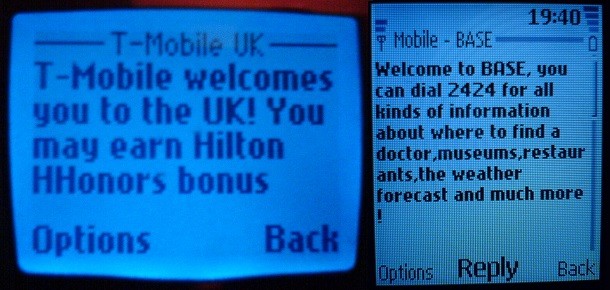 Have you heard of smishing? Smishing is the Internet scammer’s technique of sending a text message (SMS) to your phone to deal with delinquency or other issues with your phone or bank account. You call the number they provide, follow the prompts, and unwittingly give up your formerly-secret account information.
Have you heard of smishing? Smishing is the Internet scammer’s technique of sending a text message (SMS) to your phone to deal with delinquency or other issues with your phone or bank account. You call the number they provide, follow the prompts, and unwittingly give up your formerly-secret account information. -
14.
 Millions of people around the world play their local lottery, hoping to be the next big millionaire. If you’re lucky, you’ll win your lottery, but if you’re really lucky, you’ll win another country’s lottery you didn’t even enter. (You lucky dog, you.) Just send the foreign lottery organization a few hundred bucks to cover the bank fees, and your newly deposited check for $50 million is as good as fake.
Millions of people around the world play their local lottery, hoping to be the next big millionaire. If you’re lucky, you’ll win your lottery, but if you’re really lucky, you’ll win another country’s lottery you didn’t even enter. (You lucky dog, you.) Just send the foreign lottery organization a few hundred bucks to cover the bank fees, and your newly deposited check for $50 million is as good as fake. -
15.
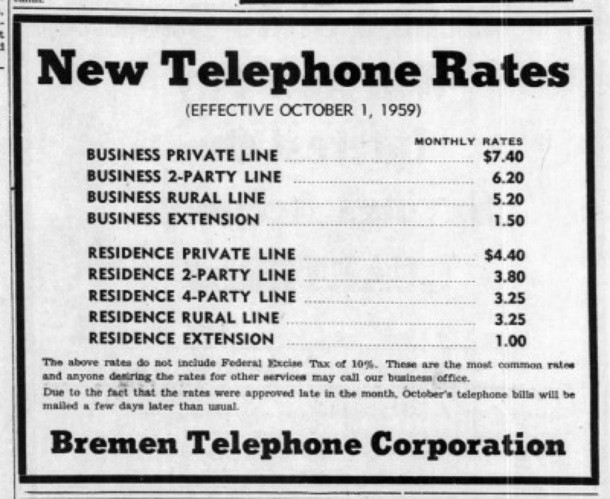 A few years ago, Facebook polls were all the rage. “Which Pokémon are you most like?” “Are you Team Jacob or Team Edward?” “What famous person has your same shoe size?” By taking the quiz and providing your phone number, the quiz services can easily tack on an extra monthly service fee to your wireless bill.
A few years ago, Facebook polls were all the rage. “Which Pokémon are you most like?” “Are you Team Jacob or Team Edward?” “What famous person has your same shoe size?” By taking the quiz and providing your phone number, the quiz services can easily tack on an extra monthly service fee to your wireless bill. -
16.
 Again digging into humans’ desire to help others, sometimes you’ll see a friend on Twitter or Instagram post a picture of a starving child with the tagline, “Just $1 can help Zachariah eat today. Click this link to donate and make sure he doesn’t go hungry.” This could be great for Zachariah – if he were real and not a Cheetos-eating, Brooklyn-living hipster scamming you out of your cash.
Again digging into humans’ desire to help others, sometimes you’ll see a friend on Twitter or Instagram post a picture of a starving child with the tagline, “Just $1 can help Zachariah eat today. Click this link to donate and make sure he doesn’t go hungry.” This could be great for Zachariah – if he were real and not a Cheetos-eating, Brooklyn-living hipster scamming you out of your cash. -
17.
 Offering items for way below market value has become a pretty common and dumb Internet hoax. Though it may seem like a great offer, the seller will often ask for a deposit on the house, car, or whatever else you’re buying but claim you can’t take a look at it yet because they’re traveling overseas. The real reason is the product doesn’t exist, and its pictures were likely taken from another, legitimate ad.
Offering items for way below market value has become a pretty common and dumb Internet hoax. Though it may seem like a great offer, the seller will often ask for a deposit on the house, car, or whatever else you’re buying but claim you can’t take a look at it yet because they’re traveling overseas. The real reason is the product doesn’t exist, and its pictures were likely taken from another, legitimate ad. -
18.
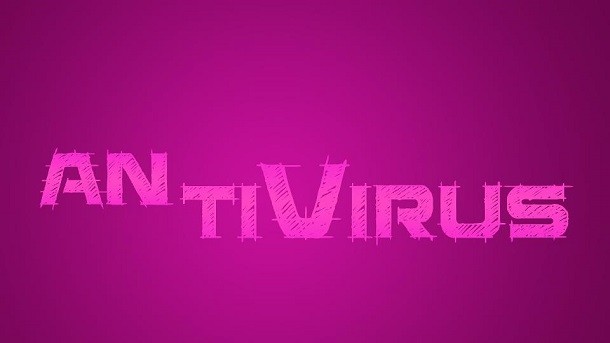 Computer viruses have become ubiquitous in the modern computing world, making antivirus software a necessity. While browsing the Internet one day, you may find a pop-up warning you that your computer is infected. After clicking to allow it to scan for free, it finds various pieces of malware (itself not included) which it can remove and speed up your PC – after you pay the fee to buy the software.
Computer viruses have become ubiquitous in the modern computing world, making antivirus software a necessity. While browsing the Internet one day, you may find a pop-up warning you that your computer is infected. After clicking to allow it to scan for free, it finds various pieces of malware (itself not included) which it can remove and speed up your PC – after you pay the fee to buy the software. -
19.
 Some companies have been caught offering seemingly “free” high school diplomas. The companies promised you could receive a GED-equivalent after paying $135-$249 and taking a multiple-choice test to prove proficiency. Besides being an outright scam, it was also an obvious one: if you didn’t pass the test, you could retake it – with the answers now highlighted.
Some companies have been caught offering seemingly “free” high school diplomas. The companies promised you could receive a GED-equivalent after paying $135-$249 and taking a multiple-choice test to prove proficiency. Besides being an outright scam, it was also an obvious one: if you didn’t pass the test, you could retake it – with the answers now highlighted. -
20.
 Airlines and hotels sometimes drop their prices close to a big holiday season if seats or rooms aren’t selling. Internet tricksters have picked up on this trend and are sending out bogus emails for super-cheap flights to exotic destinations or for five-star hotels at the price of a one-star. Some of these offers will flat-out be fake and some will have hints of truth coupled with hundreds or thousands of side costs which you’ll have to pay to get the initial offer.
Airlines and hotels sometimes drop their prices close to a big holiday season if seats or rooms aren’t selling. Internet tricksters have picked up on this trend and are sending out bogus emails for super-cheap flights to exotic destinations or for five-star hotels at the price of a one-star. Some of these offers will flat-out be fake and some will have hints of truth coupled with hundreds or thousands of side costs which you’ll have to pay to get the initial offer. -
21.
 Internet fraudsters have recently been catching fools with a really dumb Internet scam. You receive a call from someone claiming to be an IRS tax agent and claiming you owe back taxes. If you don’t pay up immediately, you’ll be arrested. The “agent” directs you to the iTunes store or Amazon where you have to buy a gift card and read off the code to them to settle your balance. When dealing with the IRS, remember: they will never initiate a call to you.
Internet fraudsters have recently been catching fools with a really dumb Internet scam. You receive a call from someone claiming to be an IRS tax agent and claiming you owe back taxes. If you don’t pay up immediately, you’ll be arrested. The “agent” directs you to the iTunes store or Amazon where you have to buy a gift card and read off the code to them to settle your balance. When dealing with the IRS, remember: they will never initiate a call to you. -
22.
 Scammers have gotten clever in recent years, even going beyond impersonating the IRS and banks to now impersonating the police. Scammers have found ways to make their number look like it’s coming from the police department as they tell you that your cousin has been arrested and needs bail money. The caller usually asks for money to be put on a pre-paid card and the card’s secret code. Besides being clearly illegal to impersonate the police, the scam has fraud written all over it.
Scammers have gotten clever in recent years, even going beyond impersonating the IRS and banks to now impersonating the police. Scammers have found ways to make their number look like it’s coming from the police department as they tell you that your cousin has been arrested and needs bail money. The caller usually asks for money to be put on a pre-paid card and the card’s secret code. Besides being clearly illegal to impersonate the police, the scam has fraud written all over it. -
23.
 Millions of people around the world would love to work from home, and Internet scammers are here to help them do just that. Just respond to their email and send a thousand bucks for the initial investment (e.g. software to process credit cards, a high-tech laminating printer), and they’ll send you back the equipment and your new business cards. Or nothing. They could also send you nothing.
Millions of people around the world would love to work from home, and Internet scammers are here to help them do just that. Just respond to their email and send a thousand bucks for the initial investment (e.g. software to process credit cards, a high-tech laminating printer), and they’ll send you back the equipment and your new business cards. Or nothing. They could also send you nothing. -
24.
 One of the most unsettling feelings for a parent is to know their child is in danger. Especially scary is when a parent receives a message on Facebook (or often times a phone call) saying their son or daughter was driving and hit a motorcyclist before fleeing the scene of the crime. The victim and his buddies caught up to him/her and has beaten them to a pulp. If you want to see them again, they force you to make a quick decision and send the money to cover the cost of the bike and all hospital expenses.
One of the most unsettling feelings for a parent is to know their child is in danger. Especially scary is when a parent receives a message on Facebook (or often times a phone call) saying their son or daughter was driving and hit a motorcyclist before fleeing the scene of the crime. The victim and his buddies caught up to him/her and has beaten them to a pulp. If you want to see them again, they force you to make a quick decision and send the money to cover the cost of the bike and all hospital expenses. -
25.
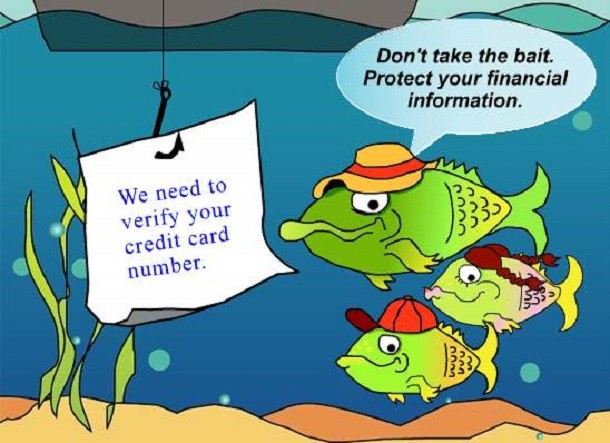 By far the most common Internet hoax is the phishing scheme. Clever thieves write you saying your account at x bank or y online shopping site has been compromised, and they need to confirm your identity. Yikes! The nice thieves want to make sure your account is not suspended so they created a fake webpage which looks like the real one so you can enter your username and password. Now that they have those details, don’t worry – they’ll take care of confirming your identity (and clearing out your account).
By far the most common Internet hoax is the phishing scheme. Clever thieves write you saying your account at x bank or y online shopping site has been compromised, and they need to confirm your identity. Yikes! The nice thieves want to make sure your account is not suspended so they created a fake webpage which looks like the real one so you can enter your username and password. Now that they have those details, don’t worry – they’ll take care of confirming your identity (and clearing out your account).
- NEXT GALLERY
-

- Things in china are done a bit differently
No list about Internet scams would be complete without the iconic Nigerian email scam. The story goes that a rich Nigerian prince (or the lawyer for a foreigner who recently died with no heirs) wants to get money out of the country. In exchange for using your bank account as safe keeping, he’ll give you a pretty hefty cut of the cash. The catch is he always starts by asking for money from you – to pay for bribes, taxes, bank fees, and anything else he can think of.
25/25
1/25
Categories:
Wow








0 Comments